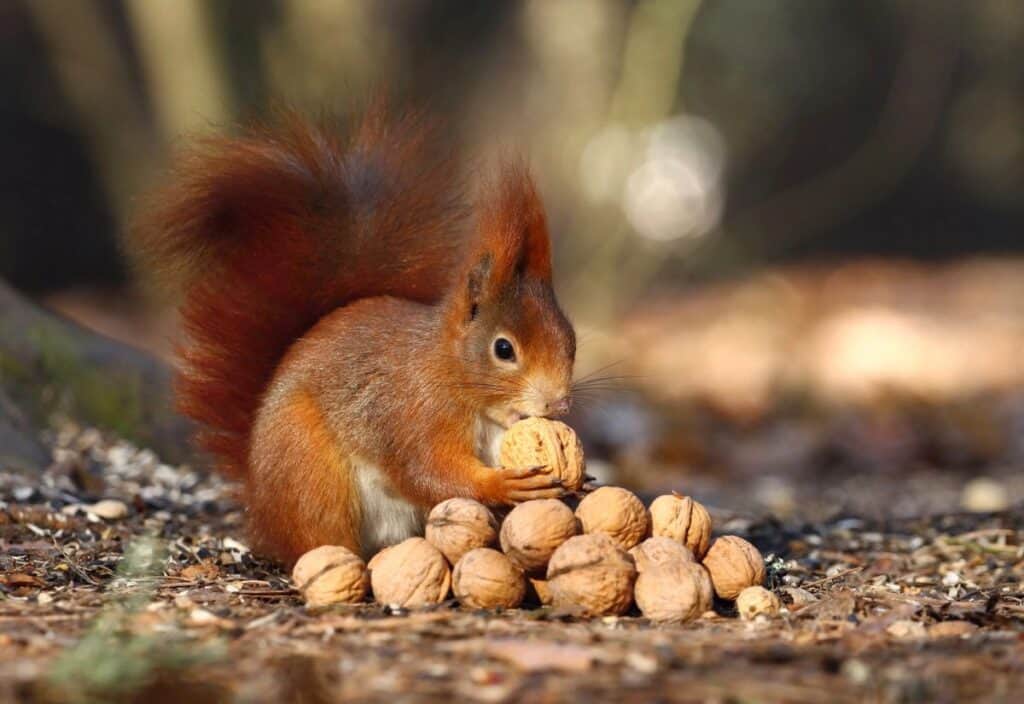Squirrels. With their bushy tails and irreverent leaps, they’ve stolen GoPros, outsmarted bird feeders and even caused city-wide blackouts. At the same time, they’ve planted entire forests, solved puzzles like furry Einsteins and become internet sensations.

Squirrel Appreciation Day, celebrated on Jan. 21, is the perfect chance to join this debate. Are these critters charming pranksters or infuriating troublemakers? Learn their clever shenanigans and ecological contributions so you can decide for yourself how to appreciate, or avoid, these crafty creatures.
Why do you love squirrels?
There’s a reason that squirrels capture your attention when they dart across the park and dangle precariously from tree branches. Their charm lies in their endless energy and clever problem-solving. But even more than being endlessly endearing, squirrels are vital contributors to nature’s balance. Here’s what makes these furry critters so appealing.
Playful antics and clever tricks
Squirrels are natural performers, leaping across branches with dexterity and burying acorns like pirates with treasure. Their antics make them a joy to watch, but it’s not just their physical stunts that are impressive. Squirrels are shockingly intelligent.
Squirrels can adapt quickly to their surroundings, like pretending to bury fake nuts when they think they’re being watched. According to a 2021 study in Frontiers in Ecology and Evolution, their problem-solving skills are comparable to primates, which can be seen in experiments where they solve puzzles for access to food. If you’re interested in watching squirrels at work, check out Mark Rober’s viral videos featuring elaborate obstacle courses that squirrels master.
Nature’s littlest foresters
Squirrels are also accidental heroes in their ecosystems. Squirrels bury nuts and often forget where they placed them, inadvertently planting thousands of trees. This may seem like a silly fluke, but this habit plays a crucial role in forest regeneration. Eastern gray squirrels have contributed significantly to repopulating hickories and oaks in northern hardwood forests.
These seed dispersal tendencies also promote biodiversity and soil health — particularly in urban areas, where tree planting is limited. By accidentally growing these trees, squirrels are helping to improve air quality and create habitats for other wildlife. While their intentions may be purely selfish, their outcomes are remarkable.
Why do squirrels drive you nuts?
For all their charm, squirrels are no strangers to controversy. Their cleverness, while entertaining, too often comes at a cost to homeowners, gardeners and power companies. Here’s a look at how squirrels test your patience and how to handle them.
Backyard bandits
Squirrels are relentless when it comes to food, especially bird feeders. Even the most intricate defenses seem to fall short against squirrels. Weight-sensitive perches, spinning baffles and even cayenne-laced bird seed are common solutions, but squirrels still find a way to outsmart them.
The garden is another battleground. Squirrels notoriously dig up freshly planted bulbs and tender roots like carrots, frustrating gardeners. Protective measures like laying mesh or chicken wire over planting areas and choosing squirrel-repellent plants like daffodils and alliums provide a way to fight back. You can reclaim your backyard from these furry pests with a bit of creativity and persistence.
Wire chewers
Squirrels’ chewing habits can cause serious electrical problems, with wires being the common target. According to the American Public Power Association, squirrels are responsible for the highest number of animal-related power outages in the United States. The chewing alone also sparks fires, creating a safety risk for homeowners and electrical companies.
For homeowners, repairing the damage doesn’t come cheap. For example, fixing electrical systems or replacing chewed wires in an attic can cost anywhere from $1500 to $5000. If the squirrel is nesting in your home, you may even need to address insulation replacement, decontamination and sealing entry points — which can add up to $3000. Using more durable materials like metal mesh and trimming tree branches to ensure they can’t climb into your home protects your property and reduces the risk of costly repairs.
Living in harmony
Squirrels may cause their share of trouble, but with a few strategic adjustments, you can coexist peacefully with these furry tricksters. One way to keep squirrels at bay is by giving them a designated area to call their own. Set up a squirrel feeding station in your backyard with peanuts, apple slices and sunflower seeds to distract them from the bird feeders. By offering squirrels an alternative, you reduce their need to scavenge, which is a great way to observe their behaviors up close.
If squirrels become more than an annoyance, you may need to consider relocation. Humane trapping and relocation require careful planning, like using traps designed specifically for squirrels, baited with peanut butter, nuts and seeds. Make sure to check these traps frequently to avoid unnecessary stress for the animal.
When relocating squirrels, you want to do it in a way that gives them the best chance of survival. Release them in a suitable wooded area at least 10 miles away from your home to prevent them from returning. Remember to review local regulations about trapping and relocating wildlife. Also, seal up all entry points in your home to ensure other squirrels don’t take their place.
A truce with the tricksters
Squirrels are equal parts fascinating and frustrating. Their playful antics and ecological contributions make them an asset, while their ability to outsmart homeowners can cause costly damage. On Jan. 21, take a moment to observe the squirrels in your area and consider their role in the bigger picture. Squirrels are here to stay, so make peace with the cute tricksters.
Jennifer Allen, retired chef turned cookbook author, blogger and traveler, shares her adventures and travel tips at All The Best Spots. Living at home with her family — and the cats that rule them all — her work has been featured in The Washington Post, Seattle Times, MSN and more.